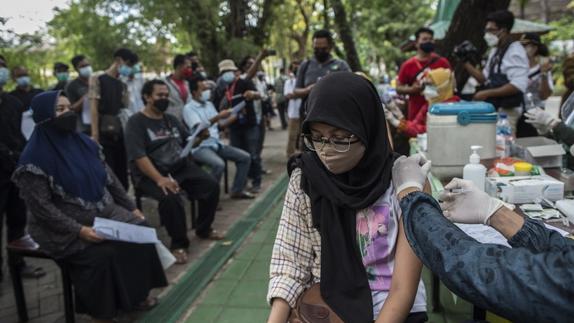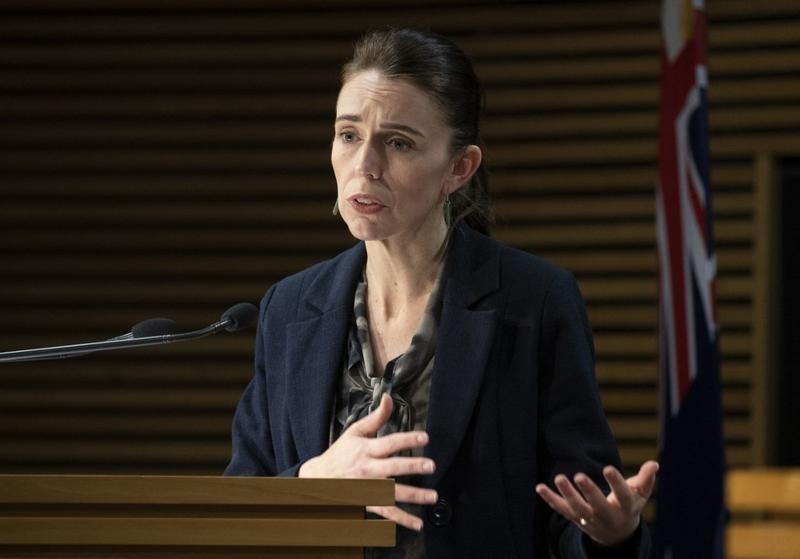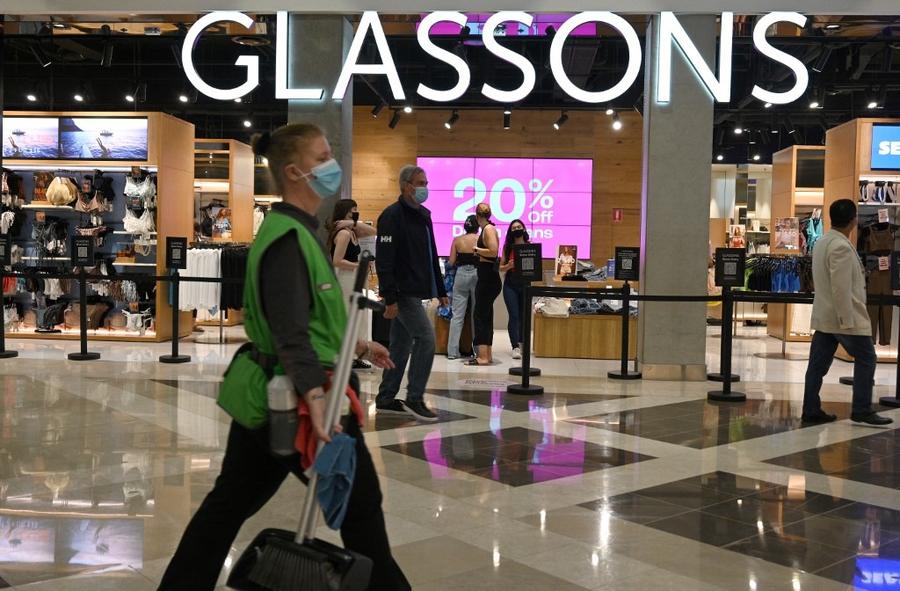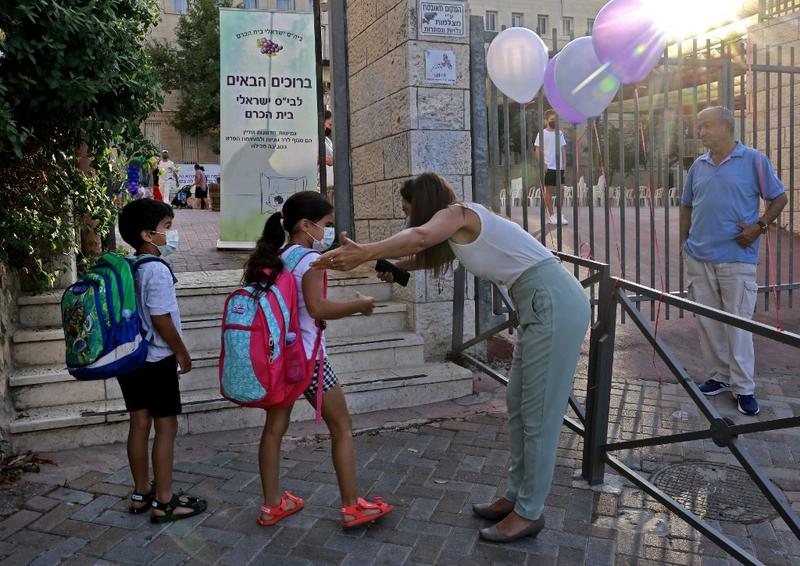 A health worker inoculates a woman with a dose of the Sinovac COVID-19 vaccine during a mass vaccination at a zoo in Surabaya on Sept 13, 2021. (JUNI KRISWANTO / AFP)
A health worker inoculates a woman with a dose of the Sinovac COVID-19 vaccine during a mass vaccination at a zoo in Surabaya on Sept 13, 2021. (JUNI KRISWANTO / AFP)
SYDNEY / RIYADH / JERUSALEM / ANKARA / KUALA LUMPUR / WELLINGTON / NEW DELHI / TOKYO / BANGKOK / JAKARTA / BENGALURU / MANILA - Indonesia expects to enter the endemic phase for COVID-19 in January, as long as it can go through the year-end holiday without a further spike in cases, according to Luhut Panjaitan, the minister overseeing the pandemic response.
The Asian nation is on course to have 122 million people fully vaccinated by year-end, Health Minister Budi Gunadi Sadikin said.
The number of COVID-19 cases in Indonesia rose by 626 within one day to 4,235,384, with the death toll adding by 47 to 142,999, the country's Health Ministry said on Monday
The number of COVID-19 cases in Indonesia rose by 626 within one day to 4,235,384, with the death toll adding by 47 to 142,999, the country's Health Ministry said on Monday.
According to the ministry, 1,593 more people were discharged from hospitals, bringing the total number of patients recovering from COVID-19 to 4,075,011.
To date, at least 107.98 million people in Indonesia have taken their first doses of COVID-19 vaccines, 63.18 million have been fully vaccinated, and about 1.07 million Indonesians have received their third doses, the health ministry said.
Children's playgrounds in malls or shopping centers in Indonesia are allowed for reopening starting Oct 19 as the transmission of the pandemic declines, Panjaitan said.
"We require that children's playgrounds must record parents' phone numbers and addresses as well as their playing time for tracing needs in case of transmission," he said in a virtual press conference.
Meanwhile, the audience capacity in cinemas which was previously limited to 50 percent is now allowed up to 70 percent.
Indonesia has extended its restrictions, locally known as PPKM which expires on Monday, until Nov 8.
India
India's vaccination campaign has slowed despite amassing record stockpiles of vaccine, health ministry data showed on Monday, as authorities maintain a wider-than-usual gap between doses in a strategy that has boosted coverage.
Domestic production of the AstraZeneca vaccine, which accounts for nearly 90 percent of administered doses, has more than tripled since May, when a supply shortage prompted India to double the period between doses to between 12 and 16 weeks.
That gap, exceeding the 8 to 12 weeks recommended by the World Health Organization, has allowed India to give at least one vaccine dose to 74 percent of its 944 million adults, with just 30 percent getting the full complement of two.
The AstraZeneca vaccine, known as Covishield, accounts for 861 million doses of India's total injected figure of 977.6 million, while its other main vaccine, Covaxin has a dose interval of four to six weeks.
Over the last few days, daily stocks of all COVID-19 vaccines have exceeded 100 million doses, the health ministry figures show, for states and federally controlled territories taken together.
In contrast, daily vaccinations have dropped to an average of 5 million doses this month and even less in the past week, off a daily peak of 25 million last month.
The ministry said it followed recommendations from a group of experts in making any changes to dosage, arrived at by weighing up "scientific and empirical" evidence.
Japan
The Japanese government said Monday that it would start conducting trials using proof of COVID-19 vaccinations or negative test results at eateries this week, aiming to maintain economic activities while preventing the spread of infections.
To extend the opening hours of restaurants, the trails will allow individuals with either proof of COVID-19 vaccinations or negative test results to eat in larger groups.
Many local governments still maintained some preventive measures after the COVID-19 state of emergency was lifted across Japan on Oct 1.
Although the daily COVID-19 infections in Japan have declined steadily since logging record cases in the summer, many medical experts warned that another wave of infections may occur during the winter.
The Japanese government wants to use the trials as a framework to avoid another strike on the economic activities.
Trials using proof of vaccination or negative test results have been conducted at professional soccer matches.
Sri Lanka
Over 7,000 tourists have arrived in Sri Lanka so far this month, giving a boost to the country's tourism industry which took a blow due to the COVID-19 pandemic, local media reported Monday.
According to official figures, 7,096 tourists arrived in Sri Lanka from Oct 1 to Oct 13.
Tourism Minister Prasanna Ranatunga said if the present trend continues, October was likely to record the highest monthly arrivals for this year.
The Tourism Ministry said that so far this year, September saw the highest tourist arrivals of 13,547. With the arrivals up to Oct. 13 added, 45,413 tourists have arrived in the country since the re-opening of borders on Jan 21, the Ministry said.
Ranatunga said that with the easing of travel restrictions, there was a growing interest from global travelers to visit the country.
 In this file photo taken on Sept 4, 2021, New Zealand's Prime Minister Jacinda Ardern speaks during a press conference in Wellington. (MARK MITCHELL / POOL / AFP)
In this file photo taken on Sept 4, 2021, New Zealand's Prime Minister Jacinda Ardern speaks during a press conference in Wellington. (MARK MITCHELL / POOL / AFP)
New Zealand
New Zealand's biggest city of Auckland will retain its lockdown for two more weeks in the battle on the Delta variant of coronavirus, as the country pushes to step up vaccinations, Prime Minster Jacinda Ardern said on Monday.
Once the poster child for stamping out COVID-19, New Zealand is now fighting a Delta outbreak that has spread across Auckland and neighboring regions despite tough lockdown and border closures.
Ardern said there would be no changes to social curbs, the toughest in the OECD grouping of 34 leading economies, that have run for 62 days in Auckland.
The lockdown in the city of 1.7 million began in mid-August, in the effort to halt the outbreak.
Some curbs were eased to let people leave home and meet loved ones outdoors in groups limited to 10, as well as permitting visits to beaches and parks.
But schools, businesses and offices remain shut, and gatherings indoors are not allowed.
New Zealand's tally of infections in the current outbreak rose to 2,005 with Monday's 60 new community cases, consisting of 57 in Auckland and three in the Waikato region.
 People walk in a shopping mall as retail businesses reopen to the public after a 106-day lockdown against the Covid-19 coronavirus, in Sydney on Oct 12, 2021. (SADDE KHAN / AFP)
People walk in a shopping mall as retail businesses reopen to the public after a 106-day lockdown against the Covid-19 coronavirus, in Sydney on Oct 12, 2021. (SADDE KHAN / AFP)
Australia
Thousands of children returned to school in Sydney on Monday after months of home learning as Australia's largest city, buoyed by rising vaccination rates, eased more COVID-19 restrictions.
Masks will no longer be mandatory in offices and more people will be allowed to gather in homes and outdoors after New South Wales state, home to Sydney, reached an 80 percent double dose inoculation rate for people aged over 16 over the weekend.
The latest in a series of planned easing of restrictions marks a shift by Australia's largest cities to living with the virus, a strategy officials have warned will bring a greater number of COVID-19 cases in coming weeks.
"This is not over, there is a long journey to go," New South Wales Premier Dominic Perrottet said on Monday, urging people to strictly follow the remaining health rules.
Retail stores, pubs and gyms can allow more vaccinated patrons and nightclubs can reopen for seated drinking, while weddings can have unlimited guests. However, all must follow social distancing measures.
The return to the classroom has been staggered, with the youngest and eldest students - those in kindergarten, year 1 and year 12 - returning on Monday. All others return next week.
New South Wales reported 265 new cases on Monday, the lowest single-day rise in 10 weeks and well below a high of 1,599 in early September.
Neighboring Victoria reported 1,903 new cases, up from 1,838 a day earlier. State capital Melbourne is on track to begin exiting its lockdown on Friday as full vaccination levels near 70 percent. The city has endured around nine months under strict stay-home orders since March 2020 - the longest in the world, according to Australian media.
Some virus-free states, however, have flagged they will keep internal borders closed amid fears that reopening could overwhelm their health systems.
By contrast, the federal government said it would roll out its vaccination passport for international travel from Tuesday, a key step in its plan to allow Australian citizens to travel abroad from next month.
Authorities said last week that vaccinated international travelers, initially only citizens and permanent residents, will be allowed to enter Sydney from Nov 1 without the need to quarantine.
With some 145,000 cases and 1,543 deaths, Australia's exposure to the coronavirus pandemic has been relatively low.
Saudi Arabia
The General Authority of Civil Aviation announced the operation of all airports at full capacity, the Saudi Press Agency reported. Meanwhile, the kingdom will continue to monitor the immunization status of travelers.
On Friday, Saudi interior minister announced the new decisions to ease preventive measures, based on the easing of COVID-19 spread, with the reporting of less than 100 daily new infections.
From Sunday, wearing masks is no longer obligatory in open-air places. The decisions also include cancelling social distancing rules and allowing full capacity in gatherings, public places, transportations, restaurants, and cinemas.
The Saudi Health Ministry will continue to monitor the situation and decide if there is a need to tighten preventive measures in case of an increase in hospitalized COVID-19 cases, including patients in the ICU.
Saudi health authorities have been attributing the reduction of new coronavirus cases to the nationwide vaccination campaign and steps to limit the spread of the virus.
ALSO READ: Saudi Arabia to ease virus curbs from Oct 17
 In this file photo taken on Sept 1, 2021, an Israeli teacher welcomes pupils wearing protective face masks upon their return to the new school year amid a surge of COVID-19 cases in Israel, at Beit Hakerem Israeli elementary school in Jerusalem. (MENAHEM KAHANA / AFP)
In this file photo taken on Sept 1, 2021, an Israeli teacher welcomes pupils wearing protective face masks upon their return to the new school year amid a surge of COVID-19 cases in Israel, at Beit Hakerem Israeli elementary school in Jerusalem. (MENAHEM KAHANA / AFP)
Israel
Israel started to enforce its Green Pass restrictions on Sunday, limiting entry to various public venues only to people who have received the third coronavirus vaccine booster.
The enforcement of the Green Pass, part of the Israeli government's plan to fight the coronavirus, started on Sunday after more than two weeks of delay.
Under the new guidelines, a person will have to receive a third dose of the coronavirus vaccine in order to be considered fully vaccinated and be eligible to receive the Green Pass. People who have recently recuperated are also eligible.
The Green Pass is a barcode valid for six months that enables entry to various venues, including restaurants, cafes, bars, cultural and sporting events, cinemas, weddings, gyms, conferences and hotels.
In order to comply with the new rules, these venues are now obliged to scan QR codes before allowing entry.
The enforcement of the Green Pass was supposed to begin on Oct. 3 but was postponed over "technical difficulties," according to a statement issued by the health ministry last week.
The move comes amid a sharp drop in new infections and severe illness in Israel, with a decrease of about 80 percent in the number of daily cases since early September, according to figures issued by the health ministry on Sunday. After a peak of 766 severe cases in late August, the number dropped to 388 on Sunday
Malaysia
Malaysia reported another 6,145 new COVID-19 infections as of midnight Sunday, bringing the national total to 2,390,687, according to the health ministry.
Some 12 of the new cases are imported, with 6,133 being local transmissions, data released on the ministry's website showed.
Another 63 more deaths have been reported, bringing the death toll to 27,921.
About 9,231 patients have been released after recovery, bringing the total number of cured and discharged to 2,270,520.
Of the remaining 92,246 active cases, 688 are being held in intensive care and 348 of those are in need of assisted breathing.
The country reported 134,180 vaccine doses administered on Sunday alone and some 77.2 percent of the population have received at least one dose and 69.7 percent are fully vaccinated.
ALSO READ: Indonesia sees lowest increase in virus deaths since May 2020
Turkey
Turkey on Sunday confirmed 24,114 new COVID-19 cases, raising its tally of infections to 7,654,277, according to its health ministry.
The death toll from the virus in Turkey rose by 186 to 67,623, while 24,403 more people recovered in the last 24 hours.
A total of 341,426 tests were conducted over the past day, it said.
Bharat Biotech
The World Health Organization on Monday asked for further data from India's Bharat Biotech to consider the company's request for an emergency-use listing for its COVID-19 shot, saying the WHO could not "cut corners" in making a decision.
Bharat Biotech, which developed Covaxin with an Indian state research body, started sharing data with the WHO from early July. The vaccine was given emergency-use authorization in India in January even before the completion of a late-stage trial, which later found the shot to be 78 percent efficacious.
Without a WHO nod, the two-dose Covaxin is unlikely to be accepted as a valid vaccine around the world and would complicate travel plans for tens of millions of Indians who have taken it.
Covaxin accounts for 11 percent of the 985.5 million total doses administered in India, and has also been exported.
"We are aware that many people are waiting for WHO’s recommendation for Covaxin to be included in the #COVID19 Emergency Use Listing, but we cannot cut corners," the WHO said on Twitter.
"Before recommending a product for emergency use, we must evaluate it thoroughly to make sure it is safe and effective."
The WHO was expecting "one additional piece of information from the company today", it added, without specifying.
Bharat Biotech, which has struggled to meet production timelines for Covaxin, did not immediately respond to Reuters requests for comment.
Philippines
The Philippines' Department of Health (DOH) reported 6,943 new COVID-19 infections on Monday, pushing the number of confirmed cases in the Southeast Asian country to 2,727,286.
The DOH also reported that 86 more people died from COVID-19 complications, bringing the country's death toll related to the virus to 40,761.
Health Undersecretary Maria Rosario Vergeire said that the virus transmission rate in the country has continued to fall.
"It can be observed that all areas have peaked and are at the downward trend," Vergeire said in an online briefing.
The DOH reported its highest ever daily tally on Sept 11, with 26,303 cases.
In Metro Manila, she said the number of daily new cases showed "a slow downward trend, with reported cases decreased 27 percent" from last week.
According to Vergeire, the Zamboanga Peninsula in the southern Philippines "is the sole region with high-risk classification" due to high infection and hospitalization rates.
"Most regions are showing negative two-week growth rates. However, the majority remain with high-risk average daily attack rates," she said, adding that the country's COVID-19 deaths have also declined.
"Weekly deaths have been increasing since the last week of July, and deaths peaked in mid-August and had been on a decline since," Vergeire said.
She said the country saw 100 deaths per day since April and recorded the highest number of fatalities in August with 5,055 or 163 deaths per day. Partial data for October have recorded over 1,000 deaths or 68 deaths per day, she added.


